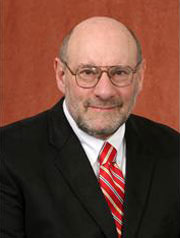CONTACT: Marshall Kapp
(850) 645-9260
marshall.kapp@med.fsu.edu
By Doug Carlson
June 2010
TALLAHASSEE, Fla. — Living wills and advance directives often don’t ensure that dying patients receive the kind of medical care they want — or don’t want — to receive. Now an effort being coordinated by the Center for Innovative Collaboration in Medicine & Law at the Florida State University College of Medicine hopes to improve communication and produce a clear set of medical orders for a dying patient’s care.
“One of the problems that frequently occur is that people get treated much more aggressively than they would want to be treated,” said Marshall Kapp, director of Florida State’s medicine and law center. “There are many reasons for that, but one of them is that doctors are afraid of legal consequences if they don’t do a full-court press for every patient.”
Such aggressive treatment not only drastically increases the cost of end-of-life care, it most often does not improve quality of life for a dying individual.
That’s why the center is coordinating efforts to promote the POLST (Physician Orders for Life-Sustaining Treatment) Paradigm, a program that is intended to ensure that a patient’s wishes regarding life-sustaining treatments are known, communicated and honored across all health care settings.
There is at least one critical difference between a POLST and a living will or an advance directive, Kapp said.
“A living will or an advance directive comes from the patient and doesn’t have any binding effect on the health care provider. The POLST is actually the doctor’s order,” said Kapp, who added that living wills and advance directives much too often are ignored by health care providers.
“The idea is that the doctor in charge would say, “Do or don’t do these certain things for this patient” and everybody — the hospital, the nursing home, the emergency medical technicians, the home health agency — everybody would buy into this and follow the doctor’s orders,” Kapp said. “And those orders obviously would be based on conversations that the doctor has had with the patient and the patient’s family.”
Kenneth Brummel-Smith, M.D., chair of the department of geriatrics at the Florida State College of Medicine, was involved in starting the POLST Paradigm while serving as chair of the center on aging at Oregon Health & Science University.
”All medical treatments are provided through what are called ‘doctor’s orders.’ If you’re in a hospital, you can’t even get an aspirin without a doctor’s order,” Brummel-Smith said. “What POLST does is take the kinds of wishes that patients state in their advance directive, and converts them into a set of doctor’s orders. Emergency personnel, nurses, and other doctors are used to dealing with that kind of communication.”
Brummel-Smith completed a study in Oregon that showed that 94 percent of patient’s wishes were followed in the hospital when the patient had a POLST, whereas only 50 percent of wishes were followed without one.
Brummel-Smith has been working with Tracy Christner, executive director of Project GRACE (Guidelines for Resuscitation and Care at End-of-life), an affiliate of the Suncoast Hospice in Clearwater, to organize and promote the POLST Paradigm in Florida. The Center for Innovative Collaboration in Medicine & Law at Florida State is coordinating their ad hoc efforts.
“Our first major event will be a conference Sept. 20 in Orlando where interested individuals from around the state will be able to brainstorm a detailed strategy for implementing POLST in Florida,” Kapp said.
Participants will develop a legal strategy for POLST becoming an accepted document in Florida and also will discuss educational strategies for informing health care professionals and the general public.
The driving forces behind the POLST initiative are the need to improve end-of-life care, rising health care costs and the intrusion of malpractice fears in the health care decision making process.
“The primary purpose is to benefit the patients and their families,” Kapp said. “But I think a clearly predictable side effect will be legal protection for the physician and for the other members of the health care team that are following the physician’s orders.”


